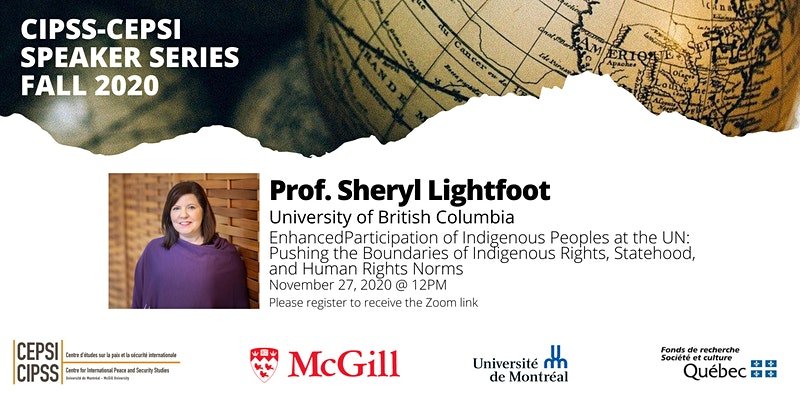Prof. Sheryl Lightfoot will explore the opportunities and challenges involved in advancing Indigenous peoples’ participation.
About this event
Enhanced Participation of Indigenous Peoples at the UN: Pushing the Boundaries of Indigenous Rights, Statehood, and Human Rights Norms
Throughout the decades that Indigenous peoples have appeared at the UN, only two paths of participation have been available to them: representation by Member States, with whom they are often in conflict, or as non-governmental organizations. Indigenous peoples have not been allowed to represent themselves as nations at the UN. Indigenous peoples have been pushing for an independent status at the United Nations for some time. However, at the World Conference on Indigenous Peoples in 2014, an important shift occurred, as states also committed to making this a reality. In practice, enhanced participation would mean that Indigenous groups, who organize and advocate for themselves in international space, without representing or being represented by states or NGOs, would be engaged in a form of global political self-determination distinct from already existing channels. This paper will explore the opportunities and challenges involved in advancing Indigenous peoples’ participation in the UN General Assembly, based on original fieldwork where I have attended drafting and consultation meetings on enhanced Indigenous peoples’ participation.
Sheryl R. Lightfoot is Canada Research Chair of Global Indigenous Rights and Politics at the University of British Columbia, where she holds academic appointments in Political Science, First Nations and Indigenous Studies, and the School of Public Policy and Global Affairs. She is the author of Global Indigenous Politics: A Subtle Revolution, a pathbreaking book that places Indigenous political theory into conversation with international relations theory. Her research focuses on Indigenous global politics, especially Indigenous rights and their implementation in global, national and regional contexts. She has published numerous articles and book chapters in North America, New Zealand and the UK. She is Anishinaabe, a citizen of the Lake Superior Band of Ojibwe.
Depuis la prise en compte des peuples autochtones aux Nations Unies, seules deux voies de participation leur ont été ouvertes: la représentation par les États membres, avec lesquels ils sont souvent en conflit, ou en tant qu’organisations non gouvernementales. Les peuples autochtones n’ont pas été autorisés à se représenter en tant que nations aux Nations Unies. Les peuples autochtones font pression pour un statut indépendant aux Nations Unies depuis un certain temps. Cependant, lors de la Conférence mondiale sur les peuples autochtones en 2014, un changement important s’est produit, les États s’étant également engagés à en faire une réalité. Dans la pratique, une participation accrue signifierait que les groupes autochtones, qui s’organisent et se défendent dans l’espace international, sans représenter ni être représentés par des États ou des ONG, seraient engagés dans une forme d’autodétermination politique mondiale distincte des canaux déjà existants. Le document présentera lors de la conférence explorera les opportunités et les défis liés à l’avancement de la participation des peuples autochtones à l’Assemblée générale des Nations Unies, sur la base d’un travail de terrain original où j’ai assisté à des réunions de rédaction et de consultation sur une participation accrue des peuples autochtones.
Sheryl R. Lightfoot est détentrice de la Chaire de recherche du Canada sur les droits et la politique des peuples autochtones dans le monde à l’Université de la Colombie-Britannique, où elle occupe des postes universitaires en science politique, en études des Premières Nations et autochtones et à l’École des politiques publiques et des affaires mondiales. Elle est l’auteure de Global Indigenous Politics: A Subtle Revolution, un livre révolutionnaire qui met la théorie politique autochtone en conversation avec la théorie des relations internationales. Ses recherches portent sur la politique mondiale autochtone, en particulier les droits autochtones et leur mise en œuvre dans des contextes mondiaux, nationaux et régionaux. Elle a publié de nombreux articles et chapitres de livres en Amérique du Nord, en Nouvelle-Zélande et au Royaume-Uni. Elle est Anishinaabe, citoyenne de la bande Ojibwée du lac Supérieur.


